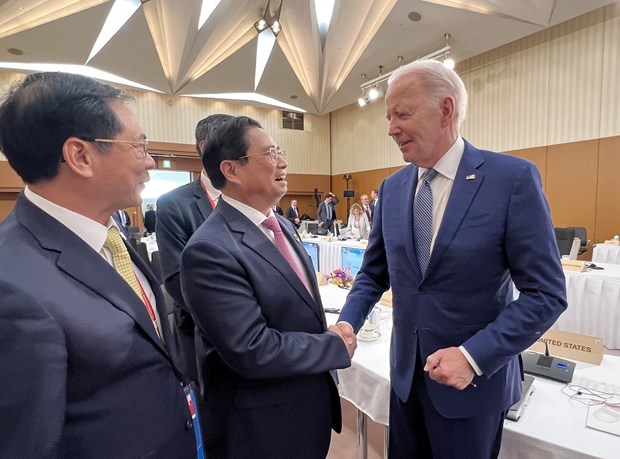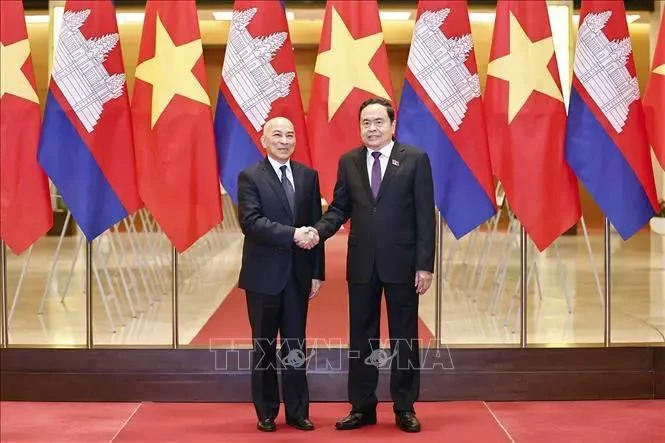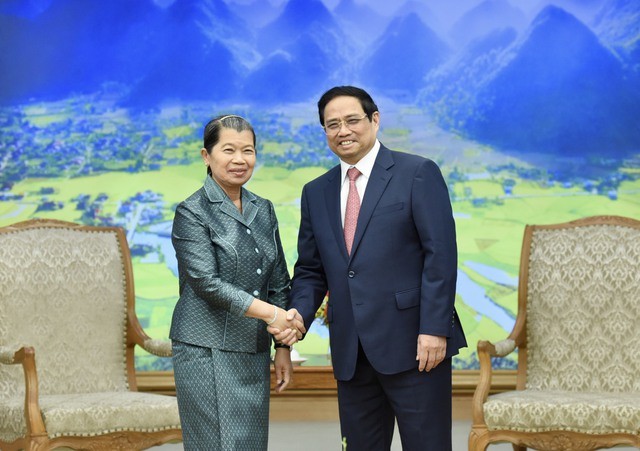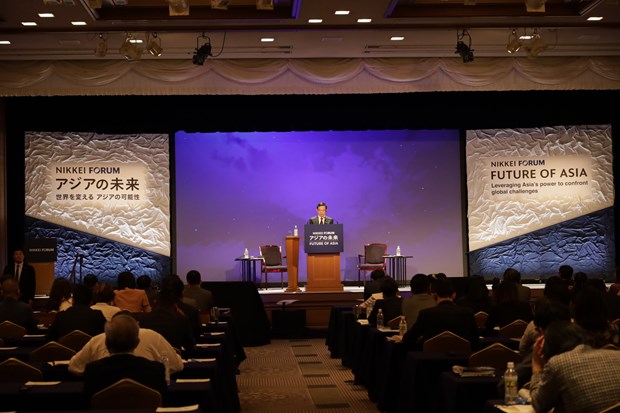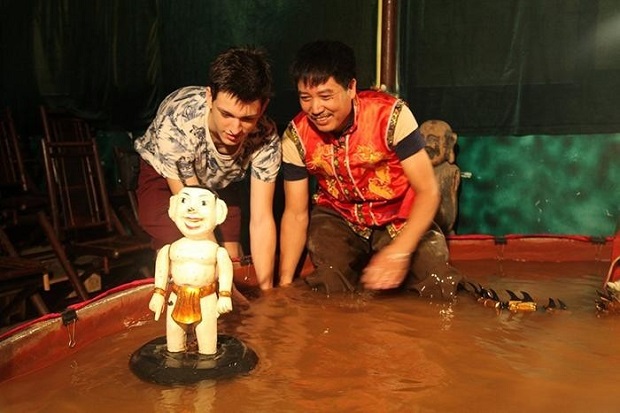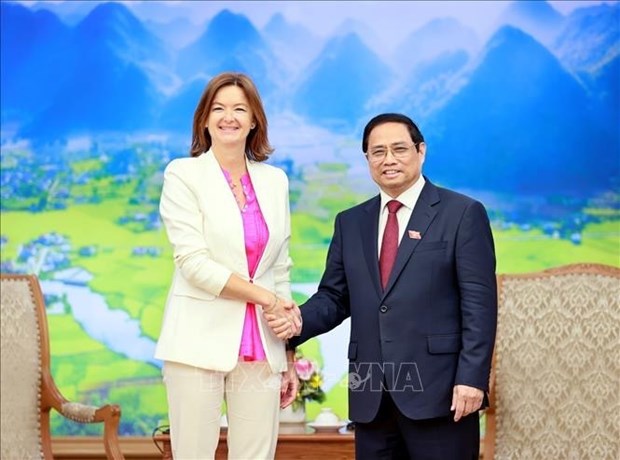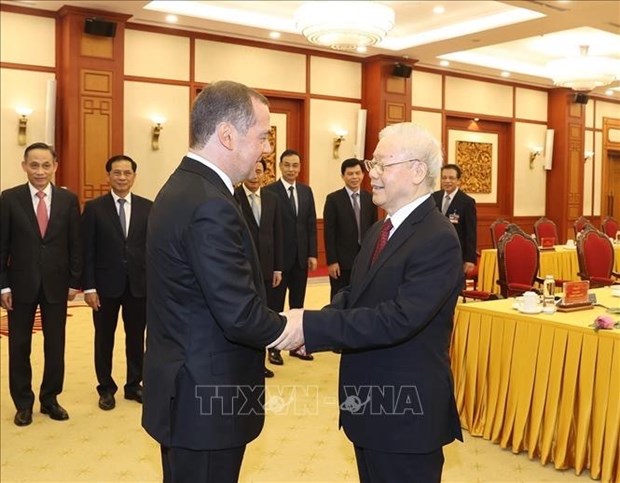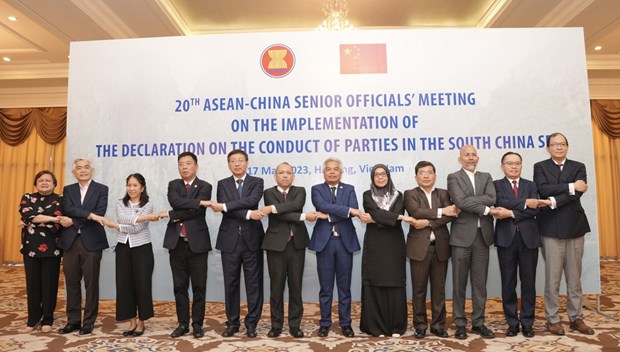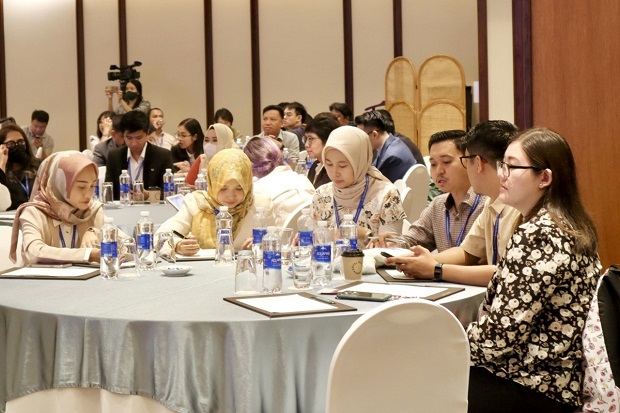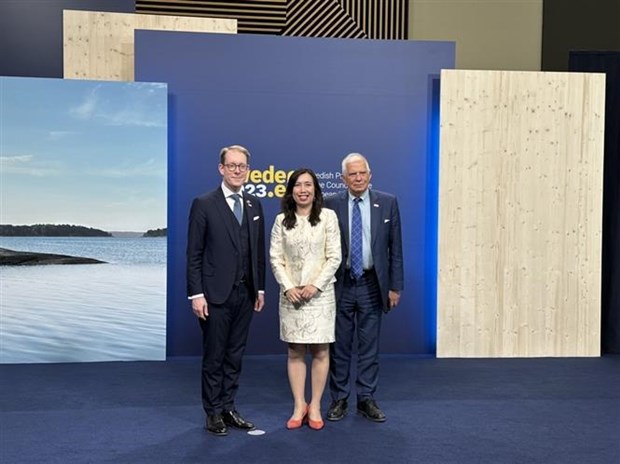PM receives leaders of Japan-Vietnam friendship associations
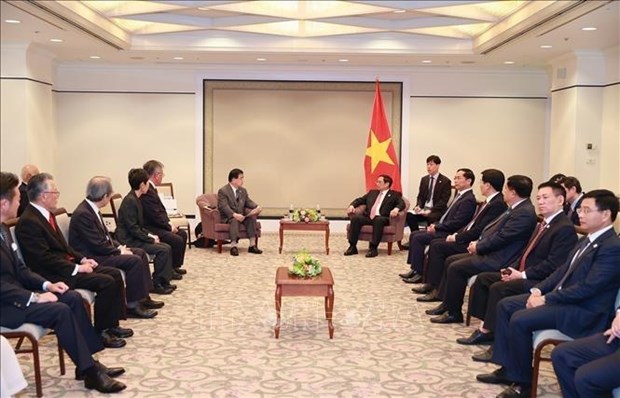
PM Pham Minh Chinh (R) receives representatives of the Japan - Vietnam Friendship Association of Hiroshima prefecture on May 19. (Photo: VNA)
Prime Minister Pham Minh Chinh on May 19 received leaders of the Hiroshima - Vietnam Peace and Friendship Association, the Hiroshima - Vietnam Association, and the Japan - Vietnam Friendship Association of Hiroshima prefecture as part of his three-day trip to attend the expanded Summit of the Group of Seven (G7) and working visit to Japan.
PM Chinh hoped that the associations will continue making contributions to promoting cooperation between Vietnam and Japan in general and with Hiroshima in particular so that the relationships will become more stable, effective, and fruitful in the future.
The associations should call on enterprises from Hiroshima prefecture to invest and step up business operations in Vietnam, he said.
They were also urged to promote people-to-people exchanges and cultural connections between Vietnam and Japan, and support Vietnamese expatriates in the south-central region of Japan so that they can promote their important role in connecting the two countries.
Akagi Tatsuo, Vice President of the Hiroshima - Vietnam Peace and Friendship Association, held that Vietnam is Japan's closest partner in Asia.
He affirmed that the friendship associations will actively implement activities following the PM’s orientations and recommendations, thus making more contributions to the Vietnam - Japan relations.
PM delivers message at G7 expanded Summit’s first plenary session
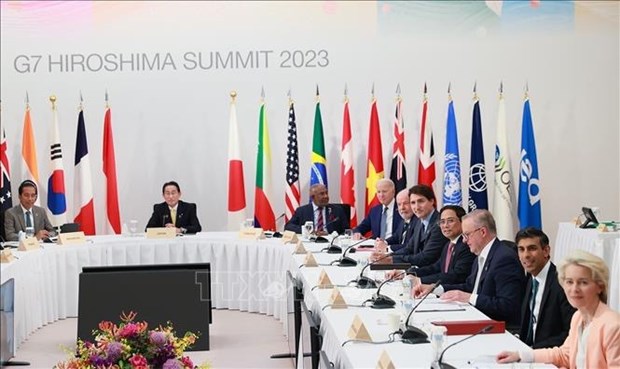
At the event (Photo: VNA)
He held that the current unprecedented context calls for actions going beyond the precedents with a global, inclusive and multilateral approach, and emphasised an urgent need for promoting and creating new driving forces serving the recovery of the global economic growth and development in a greener, cleaner and more sustainable direction.
PM Chinh proposed improving the global economic governance efficiency; strengthening policy coordination, particularly in interest rates, finance-currency, trade-investment; and reforming a World Trade Organization-centred multilateral trading system.
Chinh affirmed that Vietnam highly values the Hiroshima Action Statement for Resilient Global Food Security, and proposed G7 and its partners step up the opening of agricultural markets, promote green agricultural cooperation, increase their participation in and support for the implementation of the South-South and trilateral cooperation mechanisms in ensuring the global food security.
In the spirit of leaving no one and no country behind, Chinh called on the G7 countries and development partners to have a specific action plan to strengthen resources support for the implementation of the SDGs, narrow the digital gap, master pioneering technologies, ensure transboundary water security, enforce gender equality, and develop effective mechanisms in response to future medical emergencies.
Chinh took the occasion to thank G7 members and the international community for assisting Vietnam in its prevention and control of and recovery after the COVID-19 pandemic. He stated that Vietnam is always an active and responsible member of the international community, proactively contributing to efforts to solve common global challenges for sustainable development and prosperity of the humanity, and for the happiness of the people.
Leaders at the event discussed measures to cope with unprecedented crisis in various areas such as food security, health care and economics-development. They emphasised the need to put development at the centre, promote initiatives to pool resources, boost public-private cooperation in infrastructure development, including the G7's PGII.
They also agreed to strongly implement the Hiroshima Action Statement for Resilient Global Food Security initiated by Japan.
PM Chinh addresses G7 expanded Summit’s 2nd session
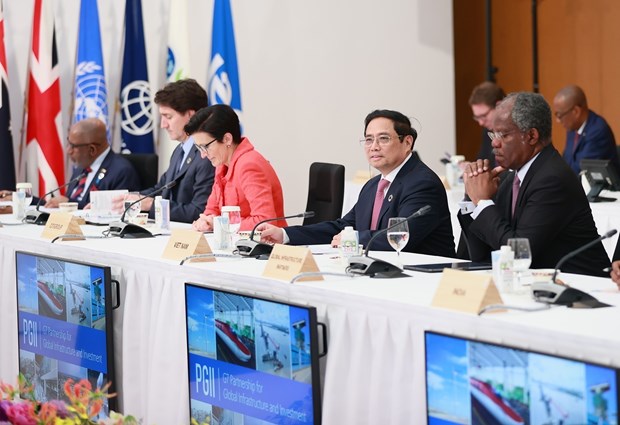
Prime Minister Pham Minh Chinh speaks at the second session of the expanded Summit of the Group of Seven (G7) in Hiroshima, Japan. (Photo:VNA)
Prime Minister Pham Minh Chinh on May 20 emphasised the importance of a global approach, multilateralism, self-reliance of every country, and extensive international cooperation to realise sustainable development, climate change responses, emission reduction, and energy transition.
Attending the second session of the expanded Summit of the Group of Seven (G7) in Hiroshima, Japan, he raised Vietnam’s point of view on ensuring fairness and reasonableness, taking into account the different conditions and levels between countries; ensuring a strategic balance between clean energy transition and global energy security; and developing fair, diversified, highly practical energy transition roadmaps in line with market rules.
Chinh emphasised that human resources, science, technology, and innovation are the central driving force for the sustainable development of all countries, the key to solving the issue of ensuring both rapid and sustainable growth.
He proposed G7 countries and international organisations to strengthen support for developing countries in technology transfer, capacity building in institutions, infrastructure, human resources, governance methods, and building an ecosystem for clean energy development.
PM Chinh said that the effective mobilisation and use of resources is the key factor for sustainable development. G7 countries should prioritise the timely and effective implementation of financial commitments for development, meeting the urgent requirements of debt relief, relaxation, and restructuring for poor countries.
The Vietnamese PM suggested that it is necessary to take a creative approach to mobilising diverse financial sources, focusing on public-private partnership (PPP), mixed-finance associated with the participation of the private sector, and foreign investment.
As for Vietnam, he affirmed the country’s determination to achieve the goal of bringing net emissions to zero by 2050 even though Vietnam is still a developing country in transition and experiencing difficulties due to wars.
PM Chinh emphasised his support for Japan's initiative - Asia Zero Emission Community (AZEC) and suggested that G7 countries and partners continue to accompany Vietnam in implementing the agreement on Just Energy Transition Partnership (JETP); and contribute to help Vietnam promote its potential and advantages, become a regional renewable energy centre, deeply participate in supporting industrial production chains in clean energy and circular economy.
He also announced Vietnam’s National Power Development Plan for the period 2021-2030 with a vision to 2050, with priority to renewable energy development.
Chinh said he hopes Vietnam will continue to receive support and effective cooperation in the management and sustainable use of water resources, improving capacity to respond to climate change and sea level rise, especially in its Mekong Delta, as well as supporting the sustainable development of the Mekong Sub-region.
At the meeting, many leaders agreed with Vietnam on the importance of international solidarity and cooperation in responding to global challenges, emphasising the need to quickly make up the shortfall in finance for climate change adaptation. They also supported Vietnam's view on balancing the implementation of the net zero emissions target with ensuring energy security.
Many countries emphasise that the energy transition can be carried out with many different routes, suitable to the circumstances and conditions of each country. G7 countries affirmed their determination to implement new initiatives such as JETP, Green Climate Fund, and Global Infrastructure and Investment Partnership (PGII).
Developing countries proposed to promote cooperation in technology transfer, concessional financing, technical assistance, and implementation of the commitment of 100 billion USD for climate finance of developed countries.
Many countries also suggested promoting diversification of the supply chain, ensuring the supply of essentials for clean energy development.
Within the framework of the session, PM Chinh attended the event on the PGII Initiative – an important initiative of the G7 group in promoting high-quality infrastructure investment in developing countries through the public finance mobilisation and the public-private partnership./.
Government leader delivers three peace messages at G7 expanded Summit’s session
Prime Minister Pham Minh Chinh on May 21 delivered a speech at the G7 expanded Summit’s working session named "Towards a Peaceful, Stable and Prosperous World” in Hiroshima, in which he affirmed Vietnam will do its best to jointly contribute to peace, stability and sustainable development of mankind. In his speech, PM Chinh highlighted Vietnam's three messages on peace, stability and development.
Firstly, he said, ensuring a peaceful and stable environment for cooperation and development is both an essential foundation and an ultimate target for sustainable and prosperous development of the world as well as each country and region.
Vietnam upholds a holistic approach to issues related to peace, security and development, as peace is the foundation, solidarity and cooperation the driving force, and sustainable development the goal.
Experiencing many wars, thanks to peace, Vietnam has risen from a poor to a middle-income country, and is aiming to become a developed, high-income country by 2045, said Chinh, stressing the need to put an end to conflicts, avoid using and threatening to use nuclear weapons, respect sovereignty and territorial integrity, and ensure food, energy and human security.
Secondly, the Government leader emphasised that the supremacy of law, the respect for the United Nations Charter and international law, and the settlement of all disputes by peaceful means should be upheld and implemented by specific commitments. He called on parties involved in all conflicts to find long-term solutions through dialogue and negotiation, with the legitimate interests of the parties taken into account.
Vietnam does not choose a side but justice, fairness, and rightness, emphasised Chinh.
As for the region, the Vietnamese leader expressed his hope that the international community and partners will maintain support for ASEAN's central role in building a region of peace, stability, cooperation and resilience.
Accordingly, countries should strictly implement the Declaration on the Conduct of Parties in the East Sea (DOC), and move towards achieving a substantive and effective Code of Conduct in the East Sea (COC) in accordance with international law, especially the 1982 United Nations Convention on the Law of the Sea (UNCLOS 1982), he said, requesting parties to exercise restraint and not to take actions that complicate the situation and violate the sovereignty, sovereign rights and jurisdiction of relevant countries established by the 1982 UNCLOS. And
Thirdly, Chinh affirmed that sincerity, strategic trust and sense of responsibility are especially important for solving current global challenges. For Vietnam, those values are reflected in the consistent implementation of its foreign policy of independence, self-reliance, peace, friendship, cooperation and development, diversification, multilateralisation, being a good friend, a reliable partner, and an active and responsible member of the international community.
Chinh and Biden agreed to maintain the exchange of all-level delegations.
PM Chinh held that bilateral relations have positively developed over the recent past, with the economic-trade cooperation being the focus. President Biden spoke highly of the outcomes of the phone talks with Party General Secretary Nguyen Phu Trong.
The two exchanged ideas on a number of measures to push up relations between the two countries and international and regional issues of mutual concern.
Also at the summit, Foreign Minister Bui Thanh Son met his US counterpart Antony Blinken, exchanging ideas on measures to accelerate the implementation of the agreements reached by the two countries’ high-level leaders.
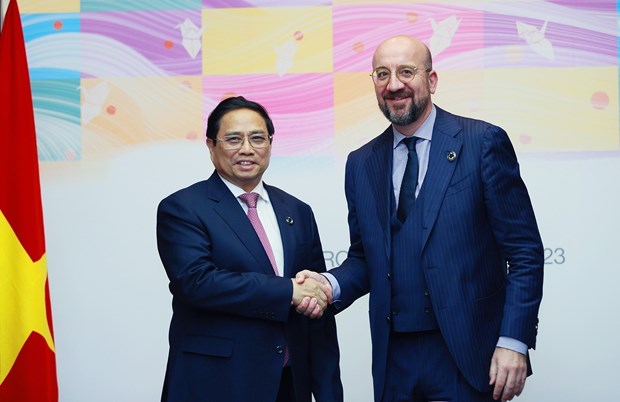
Prime Minister Pham Minh Chinh meets with President of the European Council (EC) Charles Michel. (Photo:VNA)
Affirming that the EU is a partner of prime importance in Vietnam’s foreign policy, PM Chinh suggested the two sides push up the exchange of all-level delegations, and maintain and bring into play the efficiency of cooperation and dialogue mechanisms in the framework of the Vietnam-EU partnership and cooperation agreement.
PM Chinh asked the EC leader to push the parliaments of member countries to soon ratify the EVIPA; and the EC to raise its voice for the EU to soon lift its yellow-card warning concerning the IUU against Vietnam’s seafood exports He also expressed his hope for the EU and member countries to continue supporting Vietnam in attracting resources to implement the statement on the Just Energy Transition Partnership (JETP).
The EC leader expressed his joy at the vigorous, intensive and extensive development in the Vietnam-EU relations, and spoke highly of Vietnam’s efforts in the corruption fight. He took note of the progress reached between the two sides in the yellow-card warning, and affirm the EU’s strong support to Vietnam in the green transformation and JETP implementation. The leader also expressed his hope for Vietnam’s continued support for the EU in strengthening relations with the ASEAN./.
Long Pham / VNA

